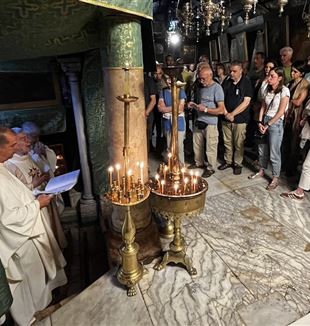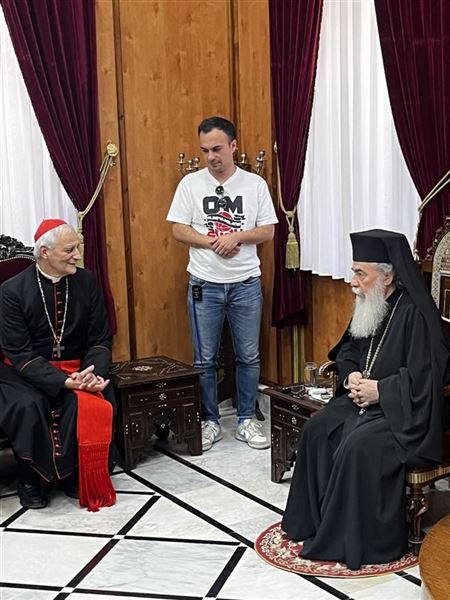
The Courage to Return
A group of friends' pilgrimage to the Holy Land with the Archbishop of Bologna, Matteo Zuppi. Like going to “visit a friend who is sick. And we leave enriched. Peace begins with us.”Since that tragic October 7, 2023, tourists and pilgrims have virtually disappeared in Jerusalem, Bethlehem, and Palestine. A tragedy within a tragedy. Everywhere. Closed stores, deserted hotels, holy places without worshippers, unemployed tour guides. That is why, as group leader Nader Tuma told the 161 pilgrims from Bologna and other Italian cities who travelled to the Holy Land June 13-16, “Seeing you here again is a great sign of hope for us; we are less alone today.” “You made it” was the incredulous expression with which many welcomed and applauded the group, even on the street.
The trigger for this certainly daring adventure, which most people advised against because of the risks involved, came from the Archbishop of Bologna Cardinal Matteo Zuppi and his vicar, Monsignor Stefano Ottani, in response to the heartfelt appeal of the Patriarch of Jerusalem, Cardinal Pierbattista Pizzaballa: “Don't leave us alone.” In just over a month, more than 20 associations and movements and many faithful from all over Italy had accepted the invitation.
Andrea Babbi, president of the travel agency of the Bolognese curia, was in a taxi in Naples when he received the phone call: “We are leaving, soon and there are many of us. You are in charge of organizing the pilgrimage.” After a moment of disbelief and fear, the first thing he did was ask his friends of the Sisters of Charity of the Assumption in Naples to pray that the pilgrimage could take place. Unexpectedly – almost miraculously – airplanes, insurance, sponsors were found. A lot of work was done with the representatives of associations and movement to organize the airlift from seven cities, manage relations with the authorities, to organize the program as much as possible for security reasons, and to rekindle the welcoming machine in the Holy Land.
It was a “fraternal and synodal” operation, Babbi commented, “inter-ecclesial,” a sign of the times for the Italian Church, “a great gift for each of us.” Before the departure, there was a collection in order to take material aid to the suffering communities, including both private donations and business contributions. A considerable amount that was distributed among the parishes, the works and the Patriarchate.
Upon their arrival, Cardinal Pizzaballa embraced everyone: “Thank you! You have made it! You were brave, now be contagious! May the pilgrimages continue to restore our hope and life.”
In a few very intense days, often beginning before dawn in prayer at the holiest sites of Christianity, after which they divided into small groups, the pilgrims met Jews, Orthodox, Christians, Protestants, Palestinians, Muslims, ordinary people, religious leaders. This included people who are in the most dramatic conditions, such as the parents of the Jewish young people held hostage by Hamas, the parish priest of Gaza, the nuns of the Baby Hospital, the Bethlehem scout group, and the friends of the House of the Magi.
In this situation of conflict and precariousness and where everything, even basic necessities, lack, what is the most urgent need? Valentina asked herself, for example. “Education! Christian schools are open to all religions and all peoples in the Holy Land, they are the point of unity and hope for the future of this land,” answered Fr. Marcelo, the parish priest of Gaza.
“The Holy Land is a complex place and it is not necessary to attempt to understand everything. One comes on pilgrimage to visit the places of Jesus. Do not pretend to find answers to all the questions that arise in a few days. We do not need people to pray for us, but with us. And we need to listen. This is the best time to come.” Those were the words of Sister Valentina from the St Joseph Hospital, which deeply impressed Federica: “They did not leave me quiet. I faced the pilgrimage differently.”
In the face of this tragedy with thousands dead, the question resurfaces: how is it possible to continue to believe in a God? For Paola and Patrizia, the answer came in the words of His Beatitude Michel Sabbah: “This land is of the Mystery of God. We live here and we cannot understand it or understand what God wants from us, but He wants to show us how to make peace. Religion is the relationship with God, personal interests make war. Where there is war, God is not there.”
The pilgrims, including some members of the movement, meeting with many other friends who live there, wanted to verify first-hand the invitation of Fr. Gianfranco, a guide in Jerusalem: “The Holy Land is the place of ‘touching.’ You will see that all the holy places ask to be touched.” “This perhaps sums up the pilgrimage,” Lucia said.
Read also - "Love given for the sake of love"
“We touched the holy places, God asked to be touched, we did it in the wounds of the inhabitants of these places, on both sides. We dipped our hand into the hole where the Cross was placed. In the same way we let Jews, Arabs, Christians, Israelis and Palestinians dip their lives into ours.” After placing his hands on the Holy Sepulcher, kneeling, Mattia had the words of Cardinal Zuppi engraved in his mind: “Resurrection does not appear without the Cross, but includes it. Evil never has the last word.” And on his return he said, “We went. As one goes to a friend who is sick, who is in need, and we return enriched. Peace begins with us, with each other, at home, now.”
A trip that internationally can only be the beginning of the return of pilgrimages.